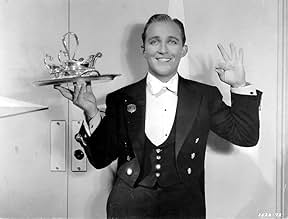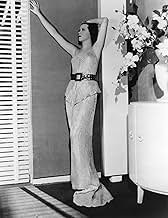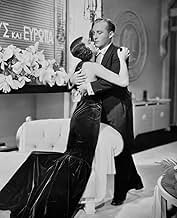A rich and famous singer disguises himself as a waiter in order to be near the woman he loves, a European princess.A rich and famous singer disguises himself as a waiter in order to be near the woman he loves, a European princess.A rich and famous singer disguises himself as a waiter in order to be near the woman he loves, a European princess.
Charles Arnt
- Higgins - Paul's Valet
- (as Charles E. Arnt)
Louise Carter
- Charity Lady
- (uncredited)
Mary Flynn
- Young Yacht Guest
- (uncredited)
Donald Gray
- Young Yacht Guest
- (uncredited)
Robert Klein
- Cloche
- (uncredited)
Cromwell McKechnie
- Paul's Secretary
- (uncredited)
Albert Petit
- Paul's Waiter
- (uncredited)
George Polonsky
- Paul's Chauffeur
- (uncredited)
Storyline
Did you know
- TriviaOriginally developed as a vehicle for Gary Cooper and Elissa Landi, but Cooper changed his mind after deciding that a love story about a duchess and a waiter wasn't for him and turned down the role. The parts were eventually given to Bing Crosby and Kitty Carlisle.
- Quotes
Countess Rostova: Who do you think was in my bedroom?
Nicki, aka Prince Nickolas: I can't imagine.
- ConnectionsReferenced in Movie Melodies on Parade (1936)
Featured review
This film is a good look at a young Bing Crosby. He was then 30 and was in his 20th film since his start in 1930. His J. Paul Jones is an established crooner of radio and records, and he's cruising in the middle of the Atlantic Ocean, where he soon lands a small fish. He checks off one more item on his list that he had made when 11 years old. The list is "Things I'll do after I've made a million bucks." Well, one of those was, "Fish in middle of Atlantic." So after the captain and others of his crew determine they are smack dab in the middle, they let Jones know and he drops a line into the water and retrieves the small fish. This was all to the delight of his passengers.
Onboard are some guests whom Jones "rescued" from the gambling tables of Monte Carlo. One of his attractive guests, Claire, is drawn to him and he to her. She fulfilled one other item on his list - to rescue a damsel in distress. Another item on his list regards the pistols that Catherine the Great of Russia gave to the famous John Paul Jones. By now, the audience realizes that Jones is a real relative of the legendary American naval hero - who was a great uncle or something, because the real Jones never married or had any children. The opening scene shows the name of the Jones yacht, the "Bon Homme Richard" out of Yorktown, Virginia. So, Jones already owns one of the pistols and is in pursuit of the other, after which he plans, on his list, to present them to the U. S. Naval Academy. Now he gets a radio message from a news hound he knows, James "Jimmy" Smith. The other pistol is reputed to be in Monte Carlo, in the possession of a former Russian princess.
Yep - this is one of the many films made in the 1930s in which characters played displaced and refugee royalty of the former Russian Empire. I don't know if Americans or the movie public in general were that enamored with the thought of the Imperial ranks that had to flee for their lives after the Bolshevik Revolution. But they did provide fodder for interesting stories; and for more that two decades after that event, Hollywood kept the interest alive with films.
So, back they go to Monte Carlo, but just to drop Jones off. His boat and guests are to cruise over to Italy where he will meet them later. The comedy now takes off with the entourage of the Princess Alexandra. Kitty Carlisle is in just her third role of a very short career in films. She became prominent on radio and TV, and sang on Broadway; and was later a popular game show panelist. I remember watching "To Tell the Truth" frequently from the mid-1950s on, and Carlisle was one of the featured panelists for some 20 years.
But, I have to say, in this film she not only isn't anything special - she sings one short song and just voices a couple of stanzas almost as a duet with Crosby. It's not very good, and other than portraying a snobbish upper crust princess, she's not even attractive. Claire, back on the boat, was much more alluring. So, I suspect that audiences at that time also had a hard time swallowing any romantic attraction of Crosby's Jones to the princess. Even though Crosby plays his part as an almost lovesick puppy in pursuit of a princess, it's hard to buy that. But then, that in itself may be part of the comedy.
I rate this film six stars for two reasons. One is the comical situation that develops as Jones becomes a hotel waiter in his effort to get close to the pistol to acquire it. And, with that comes the other -- the comedy that is provided by the stellar supporting cast of actors. Reginald Owen as Prince Vladimir, Roland Young as Prince Nicholas, William Frawley as Jimmy Smith, and Akim Tamiroff as the hotel manager provided many of the occasions for laughter in "Here is My Heart."
Modern audiences probably wouldn't care much for this film, and its portrayal with the displaced Russian royalty doesn't really give a feel for the history or the times of the film. But, film buffs - those who enjoy all aspects of the cinema, including its early history and prolific production of movies over the decades, may be interested and enjoy it some. And, how many of us remember our history - that John Paul Jones actually got permission from the U. S. to serve in the Russian navy? Catherine the Great asked him to help the Russian fleet in the Black Sea against the Ottoman Empire.
Here are a few of the better lines from this film.
J. Paul Jones, "You're right, Jimmy. They're a couple of snobs. I think I'll stay over and tell her so." James Smith, "That's right. Stand outside her door and yodel, 'Snob!'"
Countess Rostova, mistaking Jones for the drunken waiter who passed out, "Waiter? What are you doing there? Why don't you bring in the dinner?" After an indignant look, Jones sees the princess behind the countess. The countess continues, "Well, are you stupid, or impertinent?" Jones, bowing "Stupid, madame." Countess, "And, impertinent. Hurry, please."
Jones, after he buys the hotel and audits the books, "Don't people ever pay their bills?" Hotel manager, "Oh, well, uh, the lower classes, uh sometimes. The middle class, always. But the upper classes, monsieur, never!"
James Smith, seeing Jones acting as waiter, "Boy, oh, boy, is this good. What a story. I can see it now. 'Warbling Waiter Outwits Royalty.'" Later, "Ah, 'Poisons Princess, Purloins Pistol."
Onboard are some guests whom Jones "rescued" from the gambling tables of Monte Carlo. One of his attractive guests, Claire, is drawn to him and he to her. She fulfilled one other item on his list - to rescue a damsel in distress. Another item on his list regards the pistols that Catherine the Great of Russia gave to the famous John Paul Jones. By now, the audience realizes that Jones is a real relative of the legendary American naval hero - who was a great uncle or something, because the real Jones never married or had any children. The opening scene shows the name of the Jones yacht, the "Bon Homme Richard" out of Yorktown, Virginia. So, Jones already owns one of the pistols and is in pursuit of the other, after which he plans, on his list, to present them to the U. S. Naval Academy. Now he gets a radio message from a news hound he knows, James "Jimmy" Smith. The other pistol is reputed to be in Monte Carlo, in the possession of a former Russian princess.
Yep - this is one of the many films made in the 1930s in which characters played displaced and refugee royalty of the former Russian Empire. I don't know if Americans or the movie public in general were that enamored with the thought of the Imperial ranks that had to flee for their lives after the Bolshevik Revolution. But they did provide fodder for interesting stories; and for more that two decades after that event, Hollywood kept the interest alive with films.
So, back they go to Monte Carlo, but just to drop Jones off. His boat and guests are to cruise over to Italy where he will meet them later. The comedy now takes off with the entourage of the Princess Alexandra. Kitty Carlisle is in just her third role of a very short career in films. She became prominent on radio and TV, and sang on Broadway; and was later a popular game show panelist. I remember watching "To Tell the Truth" frequently from the mid-1950s on, and Carlisle was one of the featured panelists for some 20 years.
But, I have to say, in this film she not only isn't anything special - she sings one short song and just voices a couple of stanzas almost as a duet with Crosby. It's not very good, and other than portraying a snobbish upper crust princess, she's not even attractive. Claire, back on the boat, was much more alluring. So, I suspect that audiences at that time also had a hard time swallowing any romantic attraction of Crosby's Jones to the princess. Even though Crosby plays his part as an almost lovesick puppy in pursuit of a princess, it's hard to buy that. But then, that in itself may be part of the comedy.
I rate this film six stars for two reasons. One is the comical situation that develops as Jones becomes a hotel waiter in his effort to get close to the pistol to acquire it. And, with that comes the other -- the comedy that is provided by the stellar supporting cast of actors. Reginald Owen as Prince Vladimir, Roland Young as Prince Nicholas, William Frawley as Jimmy Smith, and Akim Tamiroff as the hotel manager provided many of the occasions for laughter in "Here is My Heart."
Modern audiences probably wouldn't care much for this film, and its portrayal with the displaced Russian royalty doesn't really give a feel for the history or the times of the film. But, film buffs - those who enjoy all aspects of the cinema, including its early history and prolific production of movies over the decades, may be interested and enjoy it some. And, how many of us remember our history - that John Paul Jones actually got permission from the U. S. to serve in the Russian navy? Catherine the Great asked him to help the Russian fleet in the Black Sea against the Ottoman Empire.
Here are a few of the better lines from this film.
J. Paul Jones, "You're right, Jimmy. They're a couple of snobs. I think I'll stay over and tell her so." James Smith, "That's right. Stand outside her door and yodel, 'Snob!'"
Countess Rostova, mistaking Jones for the drunken waiter who passed out, "Waiter? What are you doing there? Why don't you bring in the dinner?" After an indignant look, Jones sees the princess behind the countess. The countess continues, "Well, are you stupid, or impertinent?" Jones, bowing "Stupid, madame." Countess, "And, impertinent. Hurry, please."
Jones, after he buys the hotel and audits the books, "Don't people ever pay their bills?" Hotel manager, "Oh, well, uh, the lower classes, uh sometimes. The middle class, always. But the upper classes, monsieur, never!"
James Smith, seeing Jones acting as waiter, "Boy, oh, boy, is this good. What a story. I can see it now. 'Warbling Waiter Outwits Royalty.'" Later, "Ah, 'Poisons Princess, Purloins Pistol."
Details
- Release date
- Country of origin
- Language
- Also known as
- The Duchess and the Waiter
- Filming locations
- Production company
- See more company credits at IMDbPro
- Runtime1 hour 17 minutes
- Color
- Aspect ratio
- 1.37 : 1
Contribute to this page
Suggest an edit or add missing content





























